
STUDI MEDIEVALI
Scope & Guideline
Exploring the Depths of Medieval Culture and History
Introduction
Aims and Scopes
- Interdisciplinary Historical Analysis:
The journal emphasizes interdisciplinary approaches, combining history with art, literature, archaeology, and linguistics to provide comprehensive insights into medieval societies. - Cultural and Religious Dynamics:
STUDI MEDIEVALI explores the interactions between different cultures and religions during the medieval period, including the coexistence of Christian, Muslim, and Jewish communities in the Iberian Peninsula. - Social Structures and Power Relations:
Research published in the journal often examines the social hierarchies, power dynamics, and governance structures that shaped medieval life, including the roles of nobility, clergy, and emerging middle classes. - Economic Practices and Material Culture:
The journal investigates the economic frameworks of medieval societies, including trade, taxation, and resource management, alongside studies of material culture that reflect daily life and societal values. - Textual Analysis and Linguistic Studies:
A significant focus is placed on the analysis of medieval texts, including manuscripts and vernacular literature, reflecting the linguistic and literary developments of the period.
Trending and Emerging
- Environmental and Economic History:
There is a growing trend towards exploring the environmental aspects of medieval life, including resource use and sustainability practices, alongside economic history that examines the impacts of climate and geography on medieval economies. - Gender Studies and Feminist Perspectives:
An increasing number of articles are focusing on the roles and representations of women in medieval society, challenging traditional narratives and highlighting gender dynamics in various contexts. - Digital Humanities and Textual Studies:
The integration of digital tools in the analysis of medieval texts and artifacts is on the rise, with scholars using digital methodologies to enhance research accessibility and visual representation. - Cultural Exchanges in the Mediterranean:
Emerging studies explore the interactions and exchanges between different cultures across the Mediterranean, particularly during periods of conflict and cooperation, reflecting a more interconnected historical narrative. - Political Emotions and Societal Dynamics:
Recent research is delving into the emotional undercurrents of political decisions and societal behaviors, offering new insights into how feelings shaped medieval governance and community relations.
Declining or Waning
- Traditional Military History:
Research focusing solely on military conquests and battles in medieval times has decreased, as scholars increasingly adopt broader socio-economic and cultural lenses to analyze historical events. - Static Views of Feudal Systems:
The examination of feudalism as a rigid, unchanging structure has shifted towards more dynamic interpretations that consider fluidity and variation in feudal relations and local governance. - Isolated Studies on Individual Monarchs:
Studies concentrating on the reigns of individual monarchs without contextualizing their rule within broader socio-economic or cultural frameworks are becoming less common, as holistic approaches gain favor. - Reduction of Archaeological Focus:
While archaeological findings remain relevant, there is a noticeable decline in papers emphasizing archaeological methodology without integrating historical narratives or contextual analysis. - Limited Engagement with Popular Culture Representations:
The exploration of medieval themes in contemporary popular culture, including literature and media, appears to be less prominent, as the journal shifts focus back to more traditional historical analyses.
Similar Journals

Magnificat Cultura i Literatura Medievals
Fostering Inclusive Research in Medieval HeritageMagnificat Cultura i Literatura Medievals, published by UNIV VALENCIA, SERVICIO PUBLICACIONS, is an esteemed academic journal that has been at the forefront of medieval studies since its inception in 2014. With its Open Access model, this journal ensures that cutting-edge research is readily available to scholars and enthusiasts alike, fostering an inclusive academic environment. Based in Spain, it boasts impressive rankings with a Q2 designation in History and a Q1 in Literature and Literary Theory for 2023, indicating its significant contribution to these fields. The journal is indexed by Scopus, achieving top-tier rankings in both Literature and History, and is recognized in the 87th and 72nd percentiles of their respective categories. With a focus on the complexities of medieval culture and literature, Magnificat serves as a vital resource for researchers, professionals, and students dedicated to exploring the rich tapestry of medieval scholarship.
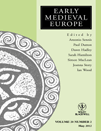
Early Medieval Europe
Charting the Course of Early European CivilizationEarly Medieval Europe, published by WILEY, is a distinguished academic journal that delves into the multifaceted history and cultural dynamics of the early medieval period in Europe. With an ISSN of 0963-9462 and an E-ISSN of 1468-0254, this journal provides a vital platform for scholars and researchers seeking to share innovative research developments within the field. Covering a range of disciplines including history and arts, it holds a category quartile ranking of Q3 in Arts and Humanities (miscellaneous) and History, alongside Q4 in Geography, Planning, and Development. Notably, it ranks #302 out of 1760 in the Arts and Humanities—History category, reflecting its significance and impact within the scholarly community. While devoted to the promotion of traditional scholarly communication, Early Medieval Europe also welcomes interdisciplinary approaches, making it a valuable resource for students, professionals, and academics interested in insights and advancements related to medieval studies. With an ongoing commitment to meaningful dialogue and exploration, this journal remains a pivotal resource for understanding the complexities of early medieval Europe.

Studia Historica-Historia Medieval
Connecting Scholars through Open Access Medieval StudiesStudia Historica-Historia Medieval, published by EDICIONES UNIV SALAMANCA, is a premier open-access journal dedicated to the field of medieval history. Since its inception in 1983, this Spanish journal has provided a platform for scholars to disseminate innovative research, analyze historical trends, and foster academic discourse within the broader historical context. With an impressive ranking of Q1 in History and a notable position within the Scopus Arts and Humanities ranking (Ranked #473 out of 1760, 73rd percentile), Studia Historica stands out as a vital resource for researchers, professionals, and students alike. The journal embraces a wide spectrum of topics related to medieval studies and offers open access to its articles, facilitating the global exchange of knowledge and ideas. With a commitment to rigorous peer review, it aims to uphold high academic standards and contribute significantly to the historiography of the medieval period.

Edad Media-Revista de Historia
Connecting Scholars: Bridging Ideas in Medieval ResearchEdad Media-Revista de Historia is a distinguished academic journal published by UNIV VALLADOLID, SECRETARIADO PUBLICACIONES, dedicated to the exploration of medieval history. With an impact factor that situates it in the prestigious Q1 quartile of historical studies, this journal, ISSN 1138-9621 and E-ISSN 2530-6448, has established itself as a vital resource for scholars and students alike, fulfilling the need for rigorous research and discourse in the field. Since its transition to open access in 2017, it has broadened its reach, allowing for greater dissemination of knowledge and facilitating the exchange of ideas among a diverse audience. Covering a period from 2017 to 2024, it aims to publish high-quality, peer-reviewed articles that contribute to the understanding of the socio-political, cultural, and economic landscapes of the medieval era. Ranked within the top 61st percentile in Scopus under the arts and humanities category, it reflects the journal's commitment to excellence and significance in historical scholarship. The journal’s office is located at Juan Mambrilla 14, Valladolid 47003, Spain, solidifying its roots in one of Europe's key historical regions.
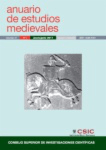
Anuario de Estudios Medievales
Bridging Past and Present in Medieval StudiesAnuario de Estudios Medievales is an esteemed academic journal dedicated to the field of Medieval Studies, published by the Consejo Superior de Investigaciones Científicas (CSIC) in Spain. With an ISSN of 0066-5061 and an E-ISSN of 1988-4230, the journal has been offering open access to researchers since 1996, fostering a collaborative and inclusive scholarly environment. Recognized for its high impact, it holds a commendable Q1 ranking in History as of 2023, reflecting its influence in the academic community. The journal encompasses a rich array of topics within medieval history, making it a vital resource for historians, scholars, and students alike who seek to explore and understand the complexities of the medieval period. With its indexed presence in Scopus, where it ranks 557th among 1760 in the Arts and Humanities category, Anuario de Estudios Medievales stands as a cornerstone publication, bridging historical inquiry and contemporary research in Medieval Studies.
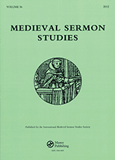
Medieval Sermon Studies
Unraveling the Tapestry of Medieval DiscourseMedieval Sermon Studies is a distinguished academic journal dedicated to the exploration of medieval sermons and their impact on literature and religious discourse. Published by Routledge Journals, Taylor & Francis Ltd, this journal has become a vital resource for scholars within the fields of Literature and Literary Theory, as well as Religious Studies. With its ISSN 1366-0691 and E-ISSN 1749-6276, it spans a decade of exceptional scholarship from 2013 to 2023. Although currently categorized as Q3 in Literature and Literary Theory and Q4 in Religious Studies according to the 2023 quartiles, the journal plays a crucial role in stimulating critical dialogues and fostering interdisciplinary research. Accessing its insightful content, while not available through Open Access, provides unique opportunities for students, researchers, and professionals to engage with the nuances of medieval rhetoric and theology. As the discourse within this field continues to evolve, Medieval Sermon Studies stands at the forefront, encouraging innovative scholarship and preserving the rich heritage of medieval thought.

Reti Medievali Rivista
Bridging Time: A Platform for Medieval ResearchReti Medievali Rivista, published by FIRENZE UNIV PRESS, stands as a distinguished platform in the field of history, specifically focusing on the medieval period. With an ISSN of 1593-2214, this journal has embraced Open Access since 2000, ensuring that its scholarly content is readily available to researchers, students, and professionals worldwide. Based in Italy, the journal boasts a Q2 ranking in the Category of History according to the 2023 quartiles, reflecting its significant impact and contribution to the discipline. With a Scopus rank of #809 out of 1760 in the Arts and Humanities category, it sits comfortably within the 53rd percentile, affirming its quality and relevance in the academic community. The journal's scope encompasses a wide range of topics related to medieval studies, making it an invaluable resource for those seeking in-depth research and analysis in this pivotal era of history. Scholars are encouraged to explore its diverse articles and insights, further enriching the dialogue surrounding medieval scholarship.

Territorio Sociedad y Poder-Revista de Estudios Medievales
Connecting Scholars through the Lens of Medieval CultureTerritorio Sociedad y Poder - Revista de Estudios Medievales is an esteemed academic journal published by the University of Oviedo, specializing in the field of medieval studies. With a commitment to advancing scholarly discourse, this journal provides a platform for researchers, professionals, and students to explore interdisciplinary perspectives on medieval society, culture, politics, and geography. While it operates as an open-access publication, facilitating widespread dissemination of knowledge, it also aims to foster a vibrant community of academics dedicated to the rich complexities of the medieval period. Set against the picturesque backdrop of Asturias, Spain, the journal invites contributions that stimulate critical thought and innovative research in the realm of medieval studies, ensuring its importance as a key resource for those interested in this captivating era.
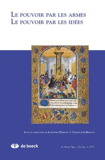
MOYEN AGE
Exploring the Depths of Medieval ThoughtMOYEN AGE is a distinguished academic journal published by LE MOYEN AGE BOECK & LARCIER S A in Belgium, focused on the multifaceted disciplines of History, Linguistics, and Literature. With its ISSN 0027-2841 and E-ISSN 1782-1436, this journal serves as a platform for researchers, professionals, and students alike to engage with scholarly articles that contribute to the understanding of medieval studies. Although currently categorized in the fourth quartile across various fields as of 2023, MOYEN AGE demonstrates a commitment to fostering academic dialogue and exploration around historical linguistics and literary theory. The journal is available via subscription, making it an essential resource for those looking to deepen their knowledge in its scope, which spans from 2001 through 2024. As it continues to evolve, MOYEN AGE remains a relevant source for emerging thinkers and established scholars drawn to the complexities of the medieval era.
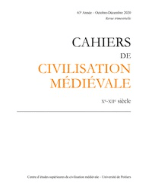
CAHIERS DE CIVILISATION MEDIEVALE
Unveiling the Rich Tapestry of the Middle AgesCAHIERS DE CIVILISATION MEDIEVALE is a distinguished scholarly journal focusing on the multifaceted aspects of medieval civilization, including its history, literature, visual arts, and performing arts. Published by the CENTRE ETUD SUPERIEUR CIV MED in France, this journal serves as a vital resource for researchers, professionals, and students striving to deepen their understanding of the medieval period. Although the journal’s impact factor and HIndex are not explicitly listed, it has been categorized in Q4 for 2023 in key areas such as History and Literature, indicating its role within niche academic discussions. With content spanning converged publication years from 2002 to 2014 and 2017 to 2023, CAHIERS DE CIVILISATION MEDIEVALE aims to foster a rich dialogue among scholars in the field, while its accessibility options provide a pathway for the dissemination of knowledge. Dive into the intricate world of medieval studies through this essential publication, which seeks to elevate the discourse and provide a platform for innovative research.